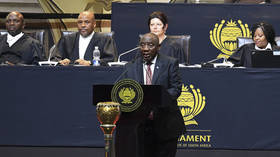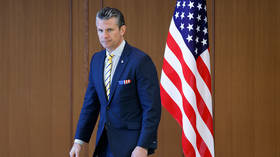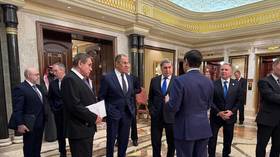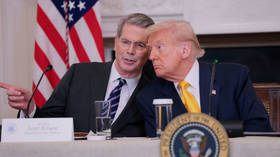South African president starts new term under power-sharing deal
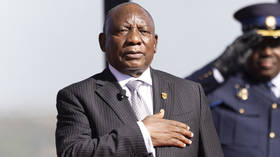
South African President Cyril Ramaphosa has been sworn in for a second term after being reelected by the National Assembly on Friday following a coalition agreement with the opposition Democratic Alliance and smaller parties.
Ramaphosa’s inauguration in Pretoria on Wednesday was attended by African leaders, including Mozambique, Namibia, Nigeria, Angola, Zimbabwe, Uganda, the Republic of the Congo, Tanzania, and Egypt. Chinese, Palestinian, and Cuban officials also attended. Russian President Vladimir Putin called the South African head of state on Monday to congratulate him on his victory.
Ramaphosa will lead the Government of National Unity (GNU), a five-party alliance that was forged after his African National Congress (ANC) lost its parliamentary majority in last month’s election.
In the presence of everyone assembled here, and in full realisation of the high calling I assume as President of the Republic of South Africa, I, Matamela Cyril Ramaphosa swear that I will be faithful to the Republic of South Africa, and will obey, observe, uphold and maintain… pic.twitter.com/sQW9lsgWaf
— Cyril Ramaphosa 🇿🇦 (@CyrilRamaphosa) June 19, 2024
“I solemnly and sincerely promise that I will always promote all that will advance the Republic and oppose all that may harm it, protect and promote the rights of all South Africans, discharge my duties with all my strength,” Ramaphosa declared while taking the oath of office administered by Chief Justice Raymond Zondo.
The ANC, in power for the three decades since the abolition of Apartheid, received only 40% of the vote in the May general election. The party won 159 seats in the 400-member assembly, down from 230. After two weeks of intense negotiations with opposition groups, Africa’s oldest liberation movement reached an agreement with longtime rivals the Democratic Alliance (DA) to form the GNU, just hours before the National Assembly in Cape Town voted to elect the new president.
Ramaphosa achieved an overwhelming victory with the DA’s backing, beating the leader of the far-left Economic Freedom Fighters, Julius Malema, by 283 votes to 44.
On Monday, the ANC announced that the power-sharing arrangement had been signed by the center-right DA, the socially conservative Inkatha Freedom Party (IFP), the right-wing Patriotic Alliance (PA), and the GOOD party. The DA, which draws support from the white minority, won 87 seats in the May 29 election; the IFP has 17, PA has nine, and GOOD won just one seat. The coalition, including the ANC, represents 273 or 68% of the seats in the National Assembly.
In his inauguration speech on Wednesday, President Ramaphosa urged all parties to put aside their differences and work together. He pledged to promote economic growth while addressing crime, housing, and infrastructure issues.
The president is expected to announce the composition of his new government, which will be negotiated with the parties involved in the alliance. His spokesman, Vincent Magwenya, told state broadcaster SABC that “the president does not want the country to go through a prolonged period of uncertainty.”
